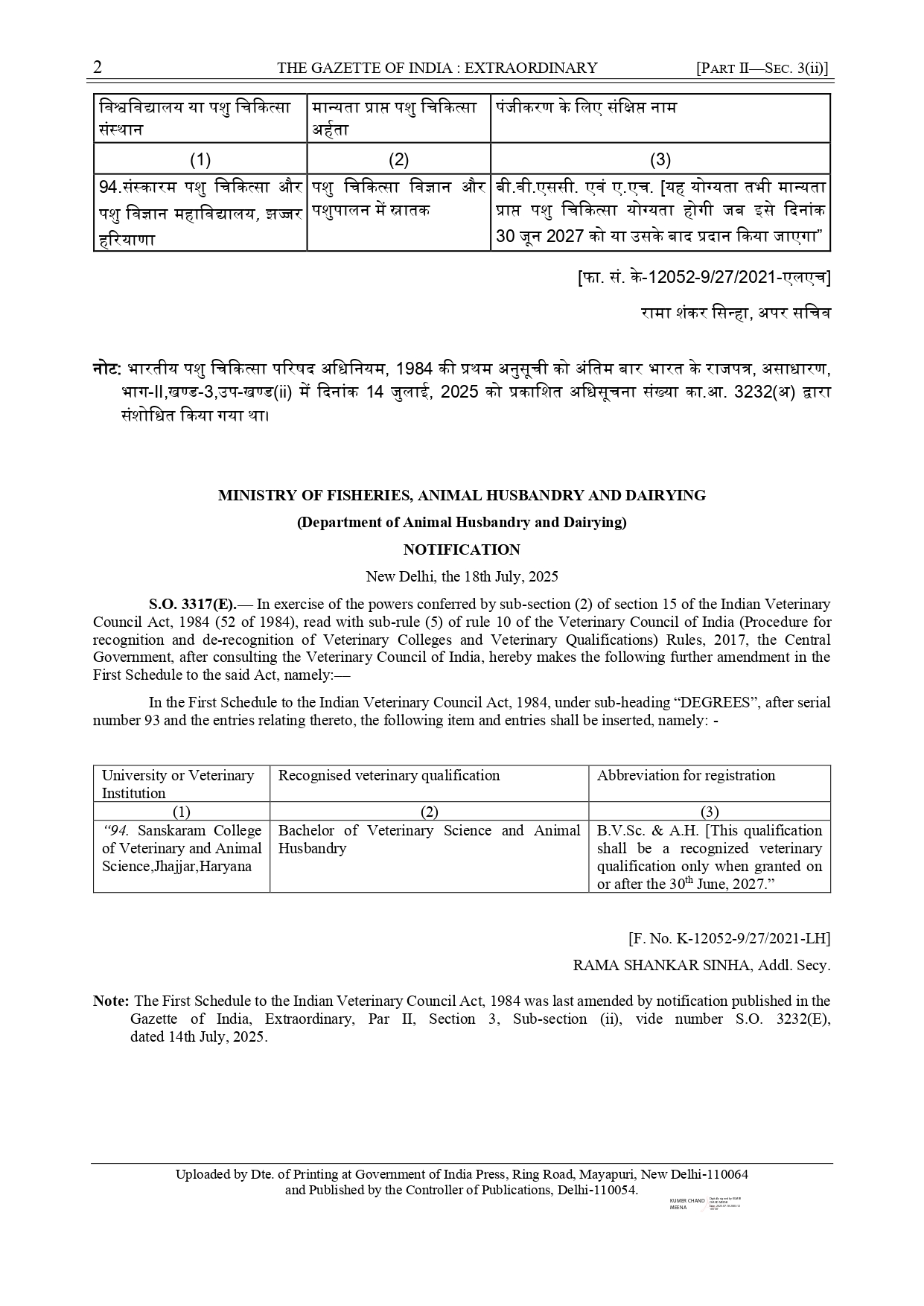The Climate Crisis and Its Impact on Agriculture
04 Oct, 2024
Dr Kunal Narwal (Assistant Professor)
Agriculture, the backbone of human civilization, is increasingly vulnerable to the adverse effects of climate change. Rising global temperatures, unpredictable rainfall patterns, and extreme weather events like floods, droughts, and heatwaves are reshaping agricultural landscapes across the world. These climate-induced challenges are jeopardizing food security, particularly in regions dependent on rain-fed agriculture, and are prompting a global search for sustainable, resilient solutions. At Sanskaram University, where the focus is on preparing students to tackle real-world agricultural problems, the development of climate-resilient agriculture is a priority.
Adopting Climate-Resilient Crop Varieties
One of the most effective strategies for combating the impacts of climate change is the development and adoption of climate-resilient crop varieties. Through advanced breeding techniques and biotechnology, scientists are creating crops that can withstand extreme temperatures, droughts, and other climate-related stresses. For example, drought-tolerant maize, salt-resistant rice, and heat-resistant wheat are already making significant differences in vulnerable regions.
At Sanskaram University, researchers are actively working on crop improvement programs that focus on developing such varieties. Students are trained to understand the importance of genetic diversity and are encouraged to engage in research on local crop varieties that are more resilient to climate-induced stresses.
Key Benefits:
- Enhanced productivity in extreme conditions.
- Reduced risk of crop failure during droughts or floods.
- Better adaptation to fluctuating weather patterns.
Diversification of Cropping Systems
Monoculture, the practice of growing a single crop species over large areas, leaves farms vulnerable to the ravages of climate change. One of the more sustainable approaches is crop diversification, where multiple crops are grown together or in rotation. This not only improves soil health but also reduces the risk of total crop failure due to adverse weather.
At Sanskaram University, students and faculty work together to explore diversified cropping systems, including agroforestry (the integration of trees and shrubs with crops) and intercropping (growing two or more crops together). These systems not only promote biodiversity but also create buffer zones that can help protect crops from climate-induced stressors such as pests, diseases, and soil erosion.
Key Benefits:
- Increased resilience to pests and diseases.
- Improved soil fertility and reduced erosion.
- Higher and more stable yields, even under variable climate conditions.
Water-Smart Farming Practices
Water scarcity is one of the most pressing challenges for climate-resilient agriculture. With unpredictable rainfall and increasing droughts, efficient water management is essential for sustainable farming. Water-smart practices such as drip irrigation, rainwater harvesting, and efficient irrigation scheduling can significantly reduce water use while maintaining crop productivity.
In regions prone to droughts, technologies like soil moisture sensors and satellite-based weather forecasting tools can help farmers optimize water usage. At Sanskaram University, students are exposed to modern water-saving technologies and learn to integrate these into farming systems. Research programs focus on optimizing water use for key crops and exploring ways to promote water conservation at the farm level.
Key Benefits:
- Reduced water consumption and waste.
- Increased resilience to drought and water shortages.
- Improved crop yields in water-scarce regions.
Agroecological Practices and Sustainable Soil Management
Soil health is a critical component of climate-resilient agriculture. Healthy soils act as carbon sinks, absorbing CO2 from the atmosphere, and improving water retention and nutrient availability. However, climate change is accelerating soil degradation in many regions, leading to reduced productivity.
Agroecological practices such as conservation tillage, cover cropping, and organic farming can restore soil health and increase its resilience to climate-related impacts. At Sanskaram University, the emphasis is on teaching students to adopt sustainable soil management practices that not only enhance crop productivity but also protect and regenerate the environment.
Key Benefits:
- Increased organic matter and soil fertility.
- Better water retention and reduced erosion.
- Enhanced biodiversity and ecosystem services.
Livestock systems are also at risk from the effects of climate change. Heat stress, water scarcity, and changing feed availability are all significant challenges for livestock farmers. To mitigate these impacts, climate-smart livestock management practices are being developed, such as improved animal housing, better feed management, and selective breeding for heat-tolerant livestock breeds.
At Sanskaram University, students learn about integrated crop-livestock systems that enhance productivity while promoting resource efficiency. Research on sustainable feed alternatives, such as drought-resistant forage crops, and improved animal health practices are integral parts of the curriculum.
Key Benefits:
- Reduced heat stress on livestock, leading to improved productivity.
- Increased resilience to water and feed shortages.
- More sustainable and efficient livestock systems.
Harnessing Technology and Innovation
Technology plays a key role in building climate-resilient agricultural systems. Innovations such as precision farming, the Internet of Things (IoT), and big data analytics allow farmers to monitor and manage their crops with greater accuracy and efficiency. Remote sensing, drones, and geographic information systems (GIS) are helping farmers make data-driven decisions to optimize planting times, water usage, and pest control.
Sanskaram University emphasizes the role of technology in agriculture, ensuring that students are equipped with the necessary skills to embrace digital tools and platforms. Courses on precision agriculture, farm automation, and data analytics help students understand how technology can make farming more resilient to climate variability.
Key Benefits:
- Optimized resource use and reduced input costs.
- Better risk management through real-time data.
- Improved decision-making for climate adaptation.
A Collaborative Effort for a Sustainable Future
The path to climate-resilient agriculture requires a multi-faceted approach that integrates sustainable practices, technological innovation, and strong collaboration between farmers, researchers, and policymakers. Sanskaram University is at the forefront of educating future leaders in agriculture which will drive the transition to more resilient and sustainable farming systems.
Through a combination of hands-on training, and community engagement, students at Sanskaram University are learning to adapt to the challenges posed by climate change. By focusing on strategies such as crop diversification, water-smart farming, and the use of modern technology, we can build a future where agriculture not only survives but thrives in the face of climate change.
Together, we can cultivate resilience, ensuring that future generations inherit a sustainable and food-secure world.





 VIEW
VIEW















